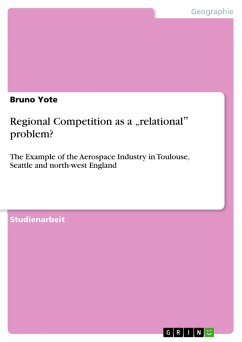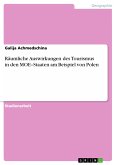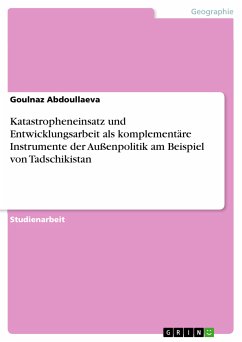Studienarbeit aus dem Jahr 2009 im Fachbereich Geowissenschaften / Geographie - Wirtschaftsgeographie, Note: 1,7, Universität zu Köln (Wirtschafts- und Sozialgeographisches Institut), Veranstaltung: Economic Geography of the EU, Sprache: Deutsch, Abstract: The relational approach goes beyond a mere geographical point of view by emphasizing its focus on the varying forms of relations (e.g. social, cultural) among actors and structures that effect dynamic changes in the spatial organization of economic activities. Its research topics are economic innovations, cross-company forms of organization and processes of collective-institutional learning.1 Hence, core elements of the relational approach are organization (e.g. cluster), evolution (e.g. historical structures), innovation (e.g. technological development) and interaction (e.g. learning, mutual trust) in and between structures and actors.2 Following the relational approach, a research of the development of the aerospace industry is of particular interest, due to its concentration as "an assembly and high-technology industry that inevitably involves a high level of inter-company collaboration"3, its internationalized character and its different development in various regions, which has been significantly influenced by organizational, structural and innovatory changes. The study reviews those changes by emphasizing on the evolutionary development of the aerospace industry in Toulouse, Seattle and North-west England in terms of historical achievements and internal and external changes. By linking relational perceptions and empirical results, the study aims to clarify if regional competition in the aerospace industry can be seen as a "relational¿ problem. Therefore, I will first give a brief proposal to amplify the relational approach, based on the work of Yeung (2005). Thereafter, I will present the empirical findings concerning aerospace-related research institutes, processes of internationalization and specification, and the creation of regional and inter-regional networks. This part is based mainly on the works of Hickie (2006) and Niosi/Zhegu (2005), as well as on Internet presentations of the different aerospace-related alliances, firms and locations of the three regions. The results of the study are going to be presented in a brief conclusion that shows how the ideas of the relational approach can be conceived concerning the aerospace industry of our three regions.
Dieser Download kann aus rechtlichen Gründen nur mit Rechnungsadresse in A, B, BG, CY, CZ, D, DK, EW, E, FIN, F, GR, HR, H, IRL, I, LT, L, LR, M, NL, PL, P, R, S, SLO, SK ausgeliefert werden.









